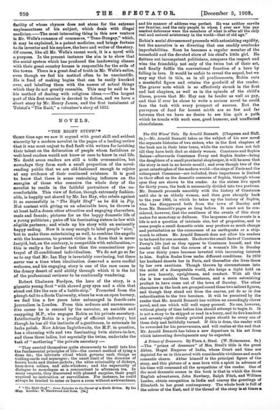NOVELS.
"THE RIGHT STUFF." •
%BOMB time ago we saw it argued with great skill and evident sincerity by a modern novelist in the pages of a leading review
that it was most unjust to find fault with writers for lavishing their talent on the delineation of people whom fastidious or well-bred readers would not know or care to know in real life.
No doubt some readers are still a trifle oversensitive, but nowadays they form such a small proportion of the novel.
reading public that we are old-fashioned enough to rejoice ,at any evidence of their continued existence. It is good to know that there is some restraining influence on the
energies of those who conceive the whole duty of the novelist to reside in the faithful portraiture of the un- comfortable. This view of fiction, though extremely fashion-
able, is happily not shared by Mr. Ian Hay, who rebels against it as successfully in "The Right Stuff" as be did in Pip. Not content with giving us an admirable hero, he throws in
ut least half-a-dozen other attractive and engaging characters, male and female ; pictures for us the happy domestic life of
a young politician ; pairs off his fascinating sisters-in-law with eligible partners; and winds up his story with an eminently
-happy ending. Now it is easy enough to label people "nice," 'but to make them entertaining as well, to combine the angelic with the humorous, to present virtue in a form that is never insipid, but, on the contrary, is compatible with exhilaration,— this is really a far harder task than the conscientious por- trayal of ill-conditioned individualism. We do not go so far as to say that Mr. Ian Hay is invariably convincing, but there never was a time when idealisation deserved a more cordial welcome, and his engaging story is one of the rare oases in the dreary desert of arid ability through which it is the lot .of the professional reviewer to be continually wandering.
Robert Chalmers Fordyce, the hero of the story, is a gigantic young Scot "with shrewd grey eyes and a chin that stood out like the ram of a battle-ship." Promoted from the plough-tail to a Scots University, where he won an open bursary, we find him a few years later submerged in fourth-rate journalism in London. From this arduous and unremunora-
tive career he is rescued by the narrator, an amiable and easygoing M.P., who engages Robin as his private secretary. Intellectually Robin is a prodigy of efficient industry ; but
though he has all the instincts of a gentleman, in externals he lacks polish. Now Adrian Inglethwaite, the llif.P. in question, has a charming wife and two fascinating twin sisters-in-law, and these three ladies, but especially the twins, undertake the • task of " mothering " the private secretary :—
" They exerted themselves quite strenuously to instil into him the fundamental principles of life—the correct method of tying a 'dress tie; the intricate ritual which governs such things as visiting-cards and asparagus ; the exact limit of the domains of trown boots and dinner-jackets ; the utter criminality of dickeys, turn-down collars, and side-whiskers ; and the superiority of dialogue to monologue as a concomitant to afternoon tea. In many respects, they discovered with pleased surprise, their pupil required no instruction or surveillance. For instance, he could always be trusted to enter or leave a room without awkwardness, • "The Right Stuff": Some Episodes in the Career of *North Briton. By Ian Alliky, London : W. Blackwood and Sons, and his manner of address was perfect. He was neither servile nor familiar, and the only people to whom I ever saw him pay marked deference were the members of what is after all the only real and natural aristocracy in the world—that of old age."
Robin's social dicrassement proceeds with astonishing rapidity, but the narrative is so diverting that one readily overlooks improbabilities. Soon be becomes a regular member of the household and the devoted slave of his chiefs little girL He flattens out incompetent politicians, conquers the respect and wins the friendship not only of the twins but of their set, and finally fulfils the conventional function of a hero by falling in love. It would be unfair to reveal the sequel, but we
may say that in this, as in all predicaments, Robin cuts a masterful figure and retains the goodwill of the reader. The graver note which is so effectively struck in the first and last chapters, as well as in the episode of the child's illness, proves that Mr. Hay can be tender as well as gay, and that if ever he chose to write a serious novel he could face the task with every prospect of success. But the purveyors of food for honest mirth are so few and far between that we have no desire to see him quit a path
which be treads with such ease, good humour, and unaffected cheerfulness.






































































 Previous page
Previous page